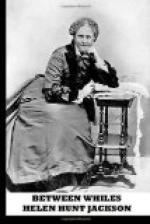“An’ did ye suppose I did not all the time know that it was to this it was sure to come, soon or late?” she said, with justifiable complacency. “It’s a good thing to have a house o’ one’s own an’ an estate. An’ the linen that’s in the house! I’ve no need to turn a hand to the flax-wheel for ten years if I’ve no mind. An’ ye can all bide your times, an’ see what John’ll make o’ the farm, now he’s got where he can have things his own way. His father was always set against anything that was new, an’ the place is run down shameful; but John’ll bring it up, an’ I’m not an old woman yet.”
This last was the unkindest phrase Mrs. John McDonald permitted herself to use. There was a rebound in it which told on the Mclntosh sisters; for they, many years older than she, were already living on tolerance in their father’s house, where their oldest brother and his wife ruled things with an iron hand. All hopes of a husband and a home of their own had quite died out of their spinster bosoms, and they would not have been human had they not secretly and grievously envied the comely, blooming Isabella her husband, children, and home.
But, with all this, it was no play-day life that Mrs. Isabella had led. At the very best, and with the best of farms, Prince Edward Island farming is no high-road to fortune; only a living, and that of the plainest, is to be made; and when children come at the rate of ten in twenty-two years, it is but a small showing that the farmer’s bank account makes at the end of that time. There is no margin for fineries, luxuries, small ambitions of any kind. Isabella had her temptations in these directions, but John was firm as a rock in withstanding them. If he had not been, there would never have been this story to tell of his Little Bel’s school-teaching, for there would never have been money enough in the bank to have given her two years’ schooling in Charlottetown, the best the little city afforded,—“and she boardin’ all the time like a lady,” said the severe McIntosh aunts, who disapproved of all such wide-flying ambitions, which made women discontented with and unfitted for farming life.
“And why should Isabella be setting her daughters up for teachers?” they said. “It’s no great schoolin’ she had herself, and if her girls do as well as she’s done, they’ll be lucky,”—a speech which made John McDonald laugh out when it was reported to him. He could afford to laugh now.
“I mind there was a day when they thought different o’ me from that,” he said. “I’m obliged to them for nothin’; but I’d like the little one to have a better chance than the marryin’ o’ a man like me, an’ if anything’ll get it for her, it’ll be schoolin’.”
The “boardin’ like a lady,” which had so offended the Misses Mclntosh’s sense of propriety, was not, after all, so great an extravagance as they had supposed; for it was in his own brother’s house her thrifty father had put her, and had stipulated that part of the price of her board was to be paid in produce of one sort and another from the farm, at market rates; “an’ so, ye see, the lass ‘ll be eatin’ it there ’stead of here,” he said to his wife when he told her of the arrangement, “an’ it’s a sma’ difference it’ll make to us i’ the end o’ the two years.”




